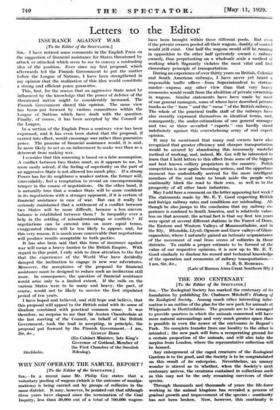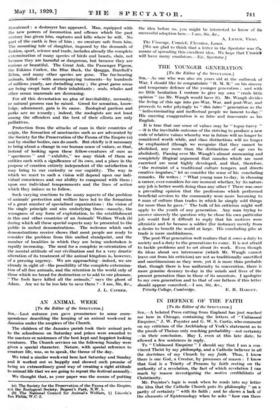THE ZOO CENTENARY
[To the Editor of the SPECTATOR.] SIR,—The Zoological Society has marked the centenary of its foundation by publishing Dr. Chalmers Mitchell's History of the Zoological Society. Among much other interesting infor- mation is an outline of the plan for the new park for animals at Whipsnade in Hertfordshire. The grounds are to be arranged to provide quarters in which the animals concerned will have more natural surroundings and very much greater space than is possible in even the newer of the enclosures in Regent's Park. No complete transfer from one locality to the other is intended ; the new park will form a recuperating ground for a certain proportion of the animals, and will also take the surplus from London, where the representative collection will be housed.
Any enlargement of the caged creatures of the Zoological Gardens is to the good, and the Society is to be congratulated on this result of its enterprise. Nevertheless, an uneasy wonder is stirred as to whether, when the Society's next centenary arrives, the creatures contained in collections such as this may not be the only remaining survivors of their species.
Through thousands and thousands of years the life-force working in the animal kingdom has revealed a process of gradual growth and improvement of the species : continuity has not been broken. Now, however, this continuity is threatened : a destroyer has appeared. Man, equipped with the new powers of locomotion and offence which the past century has given him, captures and kills where he will. No part of the earth is free of him ; no creature safe from him. The mounting tale of slaughter, imposed by the demands of fashion, sport, science and trade, includes already the complete extermination of many species of birds and beasts, slain, not because they are harmful or dangerous, but because they are curious or beautiful. The Great Auk, the Passenger Pigeon, the Eskimo Curlew, the Blue Buck, the Quagga, Burchell's Zebra, and many other species are gone. The fur-bearing animals, killed—with accompanying torments—by hundreds of millions yearly, are dwindling away ; the great game areas are being swept bare of their inhabitants ; seals, whales and other ocean mammals are decreasing.
For all this devastation no plea of inevitability, necessity, or natural process can be raised. Greed for sensation, know- ledge, adornment, gain is its cause. Zoological gardens and parks are no remedy ; indeed, the zoologists are not least among the offenders and the best of their efforts are only palliatives.
Protection from the attacks of man in their countries of origin, the formation of sanctuaries such as are advocated by the Society for the Preservation of the Fauna of the Empire (a) and by similar bodies, can do much. But chiefly is it necessary to bring about a change in our human sense of values, so that, instead of looking upon these fellow-creatures of ours as specimens and " exhibits," we may think of them as entities each with a significance of its own, and a place in the purpose of creation entirely independent of the satisfaction it may bring to our curiosity or our cupidity. The way in which we react to such a vision will depend upon our indi- vidual consciences and our ability to compound with them ; upon our individual temperaments and the lines of action which they induce us to follow.
Such varying reactions to the many aspects of the problem of animals' protection and welfare have led to the formation of a great number of specialized organizations : the vision of the single principle and aim underlying them—namely, the wrongness of any form of exploitation, to the establishment in this and other countries of an Animals' Welfare Week (b) during which all these special aspects may be presented to the public in united demonstrations. The welcome which such demonstrations receive shows that most people are ready to consider the problem from this unified standpoint, and the number of localities in which they are being undertaken is rapidly increasing. The need for a complete re-orientation of the mental attitude of our civilization and for a very drastic alteration of its treatment of the animal kingdom is, however, of a pressing urgency. We are approaching—indeed, we are already in sight of—the possibility of the complete extermina- tion of all free animals, and the retention in the world only of those which we breed for destruction or to add to our pleasure. " The fools have killed all the animals," says the ghost of Adam. Arc we to be too late to save them ?—I am, Sir, &c., J. L. CATHER.











































 Previous page
Previous page